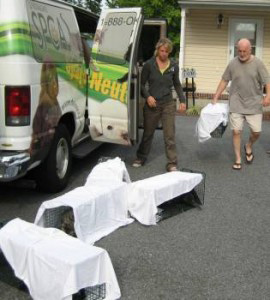Community Cats Program
 Harrington is partnering with the Brandywine Valley SPCA, Kristi’s Kats, The Humane Society of the United States, Alley Cat Allies, and volunteers from the community to implement a stray and feral cat management program. Based on the recommendation of animal experts, Harrington has adopted a Trap-Neuter-Return (TNR) program to handle the stray and feral cat problem. This page contains information about the program and what you can do to help.
Harrington is partnering with the Brandywine Valley SPCA, Kristi’s Kats, The Humane Society of the United States, Alley Cat Allies, and volunteers from the community to implement a stray and feral cat management program. Based on the recommendation of animal experts, Harrington has adopted a Trap-Neuter-Return (TNR) program to handle the stray and feral cat problem. This page contains information about the program and what you can do to help.
***Please note this program is for city residents only***
Stray and feral cat management is needed. There are problems associated with colonies of free-roaming cats for both the animals and the community. These issues are magnified as the population of the colony continues to quickly grow:
- frequent and loud noise from fighting and mating behavior
- strong, foul odors from unneutered male cats spraying to mark their territory
- flea infestations and property damage
- visible suffering from dying kittens and injured adults
- high mortality rate resulting from malnourishment and parasitic infection
- males that roam and fight may be injured and transmit diseases to one another through bite wounds
- higher animal control costs associated with trapping, caring for, and euthanizing feral cats
- Feral Cats – FAQs

Trap, Neuter, and Return (TNR) Program:
The program being used to manage stray and feral cats is a Trap, Neuter, and Return program. TNR is a non-lethal strategy to reduce the number of stray and feral cats and improve the quality of life for the cats, other wildlife, and people. Colonies of cats are trapped; transported to a facility to be spayed or neutered, vaccinated for rabies, and ear-tipped*; and returned to the site where they were captured where a caretaker will supervise the colony. There is an immediate reduction in cats because trapped stray and feral cats that are sick or injured are euthanized and kittens are evaluated for adoption. Ending reproduction means that cat population will reduce over time as the population naturally dies off. People and pets are protected from the possibility of rabies infection. Colony caretakers provide food, water, and shelter for stray and feral cats, seek care for injured or sick cats, and trap new cats for neutering and vaccination or adoption. Feral cat nuisance behaviors diminish once neutered, and their quality of life and health improves because they no longer have kittens or fight over mates.
*Ear-tipping involves the surgical removal of the top of the cat’s ear, which does not hurt the cat and is a visual indicator that the cat has been neutered and vaccinated.
How to help:
This program relies on the support of volunteers and donations. Any and all help is appreciated. Thank you!
-
- Monetary donations assist with the purchase of traps, veterinary services, and resources for colony caregivers.
- Donations can be mailed to or dropped-off at Harrington City Hall:
City of Harrington – Community Cat Program
106 Dorman Street
Harrington, DE 19952
Please make checks payable to the City of Harrington. - Community Cats Donation Form
- Volunteer. Being a caretaker involves providing food, water, and shelter for stray and feral cats; monitoring the cats for problems; and trapping new cats to be placed in the TNR program. The colony caretaker is a vital person to the long-term strategy of the TNR program to reduce the number of feral cats and improve quality of life. If you would like to donate your time to colony care-taking, please contact the Code Enforcement Officer at (302) 398-4428.
- Report free-roaming cats. Please call the Code Enforcement Officer at (302) 398-4428 to report stray and feral cats so that they can become part of the TNR program.
Community Cats Program Partners:
- Delaware Office of Animal Welfare
- Alley Cat Allies
- Delaware SPCA
- The Humane Society of the United States
- Best Ace Hardware
- Remington Vernick & Beach Engineers
- Downtown Junction
Thank you to our sponsors:
- Lee & Margaret Dean
- Myrna Graham
Announcing a new public website to connect Delawareans to pet services
